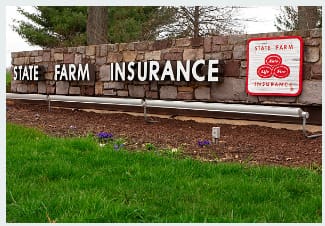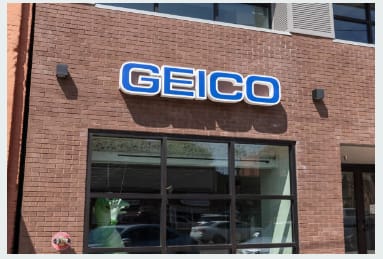The Best Car Insurance Companies in Texas
The best car insurance companies in Texas, according to various sources, include:
- State Farm
- Geico
- Allstate
- Texas Farm Bureau
- USAA (available only to military members, veterans, and their families)
- The General
- GAINSCO
- Direct Auto
These companies have been highlighted across different platforms for their competitive rates, customer service, and comprehensive coverage options
-
State Farm
State Farm is a major car insurance provider in Texas, offering competitive rates and a variety of coverage options. Here are some detailed aspects of State Farm’s car insurance offerings based on Forbes Advisor’s review:

- Cost for Good Drivers: State Farm’s national average annual cost for good drivers is $1,959, which is below the average for the companies analyzed.
- Speeding Ticket Holders: For drivers with a speeding ticket, State Farm’s rate is competitive at $2,311.
- Accident with Injury: If a driver caused an accident resulting in injury, State Farm’s rate is $2,554.
- DUI Convictions: For drivers with a DUI, the rate is $3,235, which is below the national average.
- Poor Credit: State Farm’s rates are higher for drivers with poor credit, at $5,051.
- Teen Drivers: Adding a teen driver costs about $2,124 annually, which is below the national averae.
- Young Drivers (18-25): For young adult drivers, State Farm offers rates lower than the national average, at $3,95.
- Senior Drivers: Rates for senior drivers are competitive, approximately $400 below the national average, at $2,85.
- Complaints: State Farm has fewer auto insurance complaints than many insurers, with complaints substantially below the industry average.
- Collision Repair Professionals Grade: Received a C- grade from collision repair professionals surveyed by the CRASH Network.
- Accident Forgiveness: State Farm does not offer accident forgiveness insuance.
- New Car Replacement: There is no new car replacement coverage offered by Stat Farm.
- Gap Insurance: State Farm does not offer gap insurance.
- Diminishing Deductible: State Farm does not have a diminishing deductible option.
-
Geico
For additional information on coverage options, discounts, or customer service reviews, it would be beneficial to visit State Farm’s website directly or consult with an insurance agent.

Geico is known for its competitive car insurance costs across a variety of driver profiles, which makes it an attractive option for those seeking affordable auto insurance in Texas. Here are some key points about Geico’s car insurance offerings:
- Costs: Geico offers great rates for good drivers, as well as for those who have a speeding ticket or poor credit, or were caught driving without insurance. They also have favorable rates for seniors and young drivers. The average annual cost for good drivers is approximately $1,716, while it goes up to about $2,098 for drivers with a speedingticket.
- Discounts and Programs: Customers can take advantage of a range of discounts and programs, such as accident forgiveness and a usage-based insurance program called DriveEasy, which can help good drivers reduce their insurance costs based on drivin habits.
- Coverage Limitations: However, Geico’s offerings have some limitations. For instance, their car insurance prices for drivers with a DUI are average, and they don’t offer coverage features like new car replacement, a vanishing deductible, or rideshare insurance. Additionally, the average discount for bundling auto and home insurance is relatively ow at 8%.
- Comparison to Competitors: When compared to other insurers, Geico’s national average rate for good drivers is below the national average, which stands at $2,150 per year, indicating that Geico is a competitive option in he market.
For more comprehensive information, including the types of coverage and customer experiences, it would be best to visit Geico’s official site or contact their customer service.
-
Allstate
Allstate is known for its comprehensive coverage options and low complaint levels but is also recognized for higher-than-average insurance costs in Texas. Here’s a detailed look at what Allstate offers and how it compares to competitors:
- Pros:
- Offers gap insurance and new car replacement coverage for new car owners.
- Provides accident forgiveness and disappearing deductible options.
- Gives a discount of about 10% for eapurchasesy purchases.
- Utilizes usage-based programs like Drivewise for additional discounts.
- Has a pay-per-mile program called Milewise for those whodrive less.
- Cons:
- Higher prices for good drivers and those with a speeding ticket or DUI.
- Above-average costs for drivers with poor credit and those who have caused an accident.
- Costlier for young drivers, parents adding a teen to their policy,and seniors.
- Cost Comparisons:
- The average annual rate for good drivers is $3,000.
- For drivers with a speeding ticket, the average rate is $3,213.
- The costs are high for drivers who have caused an accident with injury ($3,870) or have a DUI ($3,856).
- For drivers with poor credit, the average cost is $4,028.
- Adding a teen driver to a policy is significantly higher than the national average.
Allstate’s rates are relatively higher, so it may be wise for customers to shop around to find the best deal that fits their needs and circumstances.
-
Texas Farm Bureau
Texas Farm Bureau offers auto insurance with some of the lowest rates in Texas, but with limited coverage options. It is only available to residents of Texas, and obtaining insurance requires a membership in the Texas Farm Bureau, which involves a separate fee. Here are the details:
- Ratings: Policygenius rates Texas Farm Bureau at 4.4 out of 5 and it holds an A rating from AM Best, indicating strong financial health.
- Pros:
- Competitive, lower-than-average rates.
- Death indemnity benefit offered.
- It’s a policyholder-owned company.
- Cons:
- Limited to Texas residents.
- Fewer coverage options compared to other insurers.
- Membership in the Texas Farm Bureau is required.
- Basic Coverages:
- Liability coverage for bodily injury and property damage.
- Personal Injury Protection (PIP) for medical expenses regardless of fault.
- Uninsured/underinsured motorist coverage.
Texas Farm Bureau has been the top-rated car insurance company in Texas for customer satisfaction in the J.D. Power U.S. Auto Insurance Study for eleven consecutive years. It offers standard types of car insurance including liability, comprehensive, and collision coverage, along with some additional coverages like roadside assistance, rental car coverage, and a death indemnity benefit. However, it does not offer gap coverage.
-
USAA
USAA offers insurance primarily to active military members, veterans, and their families. It is known for competitive rates significantly lower than the national average. Here’s a breakdown:
- Cost: On average, USAA car insurance costs $1,120 per year for full coverage, which is more than $1,000 less annually than the average national rate of $2,148.
- Rate Comparisons:
- For a good driver with good credit: $1,120 (USAA) vs. $2,148 (National average).
- After an at-fault accident, good credit: $1,590 (USAA) vs. $3,164 (National average).
- With a recent DUI, good credit: $2,159 (USAA) vs. $3,933 (National average).
- Good driver, poor credit: $1,990 (USAA) vs. $3,455 (National average) .
- Coverage: USAA provides standard auto insurance coverage options, including accident forgiveness (which may be free in some states after five accident-free years) and rideshare insurance for those driving for companies like Uber or Lyft.
For further detailed information, one would need to review the specific policy documents or contact USAA directly, as coverage details and eligibility can vary.
-
The General
The General is a car insurance company that specializes in nonstandard auto insurance, catering specifically to high-risk drivers across the United States. Below are the details of their services:
- Pros:
- Provides SR-22 filings for those needing to prove insurance coverage to the state.
- Tailored to high-risk drivers who might struggle to find affordable coverage elsewhere.
- Offers a mobile app and online portal for account management and claims filing.
- Cons:
- Records a very high level of complaints with state insurance departments.
- Lacks good driver coverage options like accident forgiveness or vanishing deductibles.
- Does not provide usage-based insurance or new car replacement.
- Coverage Availability: Nationwide, for all 50 states and Washington, D.C..
- Specialization: Focuses on providing coverage for those with a history of driving violations, poor credit, or lapsed coverage.
- Coverage Types:
- Offers standard coverage such as liability and comprehensive insurance.
- Additionally, provides coverage for custom equipment, roadside assistance, and accidental death and funeral costs.
The General could be a consideration for those who have difficulty obtaining insurance due to their driving record or credit history but may not be the best choice for those with a solid driving background looking for more comprehensive coverage benefits.
-
GAINSCO
GAINSCO specializes in low-cost non-standard or high-risk auto insurance and is available in 17 states. Here are the details regarding their service:
- Pros:
- Offers customizable insurance policies.
- The company is owned by MGA Insurance which has a strong financial backing.
- It has excellent customer satisfaction ratings according to MoneyGeek.
- Provides online bill payment options.
- Cons:
- Does not offer discounts or add-on coverages.
- It has an average number of customer complaints and a financial stability rating.
- GAINSCO does not sell auto insurance in all states.
- The company’s website offers little information regarding coverages and discounts.
- Customer Service:
- GAINSCO has an A- rating from the Better Business Bureau overall.
- However, customer reviews indicate issues with customer service, specifically concerning billing confusion and claims coverage.
Overall, GAINSCO may suit those looking for basic high-risk auto insurance but may not be the best choice for those who seek extensive coverage options or operate in states where GAINSCO does not provide services.
-
Direct Auto
Direct Auto specializes in insurance for high-risk drivers and offers several coverage options and discounts:
- Pros:
- Caters to high-risk drivers.
- Provides SR-22 filings and non-owner insurance policies.
- Coverage Options:
- Accidental death benefits.
- Emergency roadside assistance.
- Insurance for driving in Mexico.
- Towing coverage and rental reimbursement.
- Accident forgiveness is available, ensuring rates don’t rise after one at-fault accident for those who qualify.
- What’s Not Offered:
- No new car replacement coverage.
- No gap insurance.
- No diminishing deductible feature.
- No pay-per-mile insurance.
- No rideshare insurance, but commercial auto insurance is available.
- Discounts:
- Various discounts including for military members, good students, multiple policies, and safe drivers.
- Customer Complaints:
- Direct Auto has a complaint level approximately six times higher than the industry average, primarily about claim handling issues.
For detailed policy information, potential customers should directly consult with Direct Auto or an insurance agent.







Whats Happening i am new to this, I stumbled upon this I have found It positively useful and it has aided me out loads. I hope to give a contribution & aid different users like its helped me. Good job.